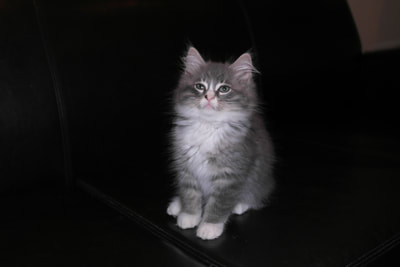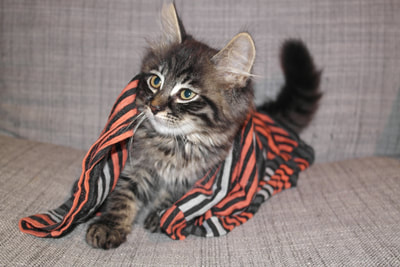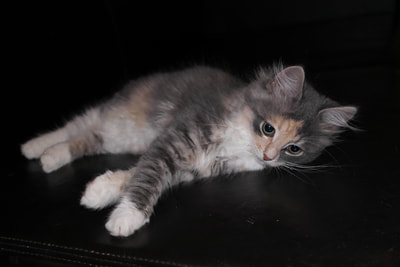 Marina J. Neary is on the Review Board of Bewildering Stories, the same magazine where I am the Book Reviews Editor. Now, it would have been unlikely our paths would have crossed electronically, as we work in completely different sections of the magazine and our sections don't tend to interact. But it turns out that we are "neighbors" in real life - we live a few towns apart in Connecticut. I've also had the pleasure to read and review a couple of her books. Her latest book is Sirens Over the Hudson, a novel that is also local, and takes place in Tarrytown and New York City. My review of it came out today in Bewildering Stories, which you can read here. Marina's books span a large number of topics and time periods, and are always engrossing to read. She has won awards for her work, and is also an accomplished poet, playwright, essayist, journalist, model, actress, dancer and choreographer. She was kind enough to chat with me about her writing process and ideas, good and bad characters, the influence of history on her work, publishing in today's market and, a favorite topic, cats! So, without further ado, let's go straight to the interview. 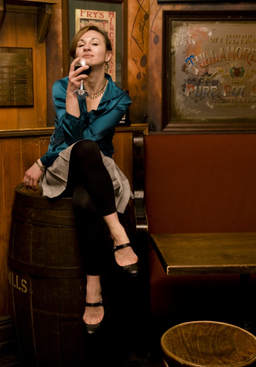 Hello, Marina, and thank you for joining me today! I had the great pleasure to read your recent book, Sirens Over the Hudson, a novel set locally in Connecticut and New York and containing a large and complex cast of characters. We'll chat more about it in a bit, but first--you have a number of novels published, which span a wide variety of subjects. What genres do you write? How did you get started on your writing journey? Thank you for taking the time to talk to a crazy cat lady! Indeed, I have written 11 novels to date. I have put my fat sausage fingers into any genre that allows a tragic, messy, depressing ending. That means hardcore historical (there are very few happy endings in history), Dystopian and social satire. To me, writing is not a journey. To me it's a confinement. A lunatic asylum for one. My own cozy, flannel straight jacket. Your novels certainly have "tragic, messy, depressing endings." When reading your books, I'm often blown away by the level of detail and plot twists. All the characters are complex. There aren't any "good" guys or "bad" guys, but simply shadings of each. What is the writing process behind your books - do you do extensive planning and research beforehand or do you just sit down, tie yourself up in your straight jacket and write? I am very glad that you picked up on the fact that I do not polarize good and bad in my novels. Some of my readers like that, while others complain that I don't give them "a hero to root for". Sorry, but I don't write screenplays for Marvel-based movies. I keep hearing "Your work is so depressing. Life is so hard already. I want some comfort food." Again, sorry, I don't serve literary mac and cheese. There are plenty of authors who do - Maeve Binchy and Nicholas Sparks for starters. I am not forcing anyone to read outside of their comfort zone. I just think it's fair to warn the readers ahead of the game: you will not walk away with a warm and fuzzy feeling after reading my works. My mission is to challenge stereotypes and encourage critical thinking. My recent novels are products of decades - yes, decades - of plotting and pondering. Some of them they started off as a series of sketches in the 1990s when I was a high-school student. As you can imagine, I was a very angry, lonely young woman, who found comfort in heavy metal, Gregorian chant, cigarettes and frankincense. I don't have your typical white bread "girl next door" American upbringing. I come from an ethnically mixed, artistic family. We came to the US as political refugees. So I never really developed a taste for white bread and mac and cheese. It's funny how American claim to be "a land of diversity", yet there is a considerable percentage of the population that adheres to that "white bread / mac & cheese" mentality. On one hand, we are being told "not to judge", and then we are being bombarded with plot lines featuring good guys in capes and bad guys in bad suits. Don't forget bad guys with bad hair, ha ha. Aside from your background and your family, what do you think most informs your writing? For example, who are some of your literary heroes and what inspires you about their work? I love obscure legends and folklore, places off the beaten path, forgotten by God. I love illuminating the lesser known historical figures. For instance, I have a series of novels set in Ireland during the Easter Rising. Instead of focusing on the iconic figures, I focus on those who were neglected by historians - accidentally or deliberately. I'm a huge fan of Fitzgerald, Hemingway and Irving, so in a way Sirens Over the Hudson is my tribute to those three American giants. Spoiler alert: the Headless Horseman makes a cameo in 21st century Tarrytown. Of course, I also use my personal experiences. They say "write what you know". Some of the scenarios and dialogues in the novel are transcribed from real life. And of course, most characters have real life prototypes. I came to the US in the early 1990s and spent my teen years in Connecticut and New York. 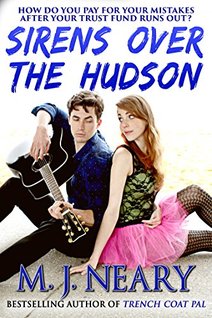 While there are a number of novels set in New York that describe only the shiny surfaces of the town elite or only the underbelly of the city, I feel that Sirens Over the Hudson takes a different tack. It examines the interaction of these two elements, surface and underneath. It examines borders, boundaries, and how to break through them. I also noticed this theme in other works of yours, where the characters act as bridges between political, religious and socioeconomic worlds. How do you think this theme of fluidity resonates with today's reader in the current national and international climate, especially when many of the events of this particular novel are set in the not-too-distant past? Again, people are going to get offended and say that "this is no laughing matter", but I believe that both sides, the red and the blue, need a little bit of humor. Having been an outsider and an outcast my whole life, I've learned to laugh at myself, my reflection, my beliefs. Maybe it's my Judeo-Slavic heritage. To me very few things are sacred. Even though I voted for Trump, I'm not above making fun of Republicans. I don't really have a place among humans, so I make fun of them: gay, straight, liberal, conservative, Muslim, Christian, you name it. It's not that I hate people. The problem is that they hate each other and themselves. I am past love or hate. So no humans to love? Maybe... kittens? (And pictures would be a bonus.) :) Sure, there are humans to love. It's just that my kind of love gets rejected. But that's fine. I have the love of God. It seems like an awfully gauche thing to say. I had seriously contemplated becoming a nun when I was a little girl. But then I realized that I would be living side by side with other women, and I just can't fathom bathing in all that estrogen. There are ways to serve God in this world. In addition to my human family and my writing, I have an amazing day in foreign exchange that allows me to utilize my knowledge of foreign languages and cultures. I also support a number of charities in the US and overseas. I also breed Siberian cats. The kittens produced by my stud Rory really make a difference in people's lives. I'm not some sociopath. Every day I try to do things to make the world a little better, brighter, funnier, less confused. Kitty pictures are coming up! Rory's kittens are going to their new moms and dad's. Rory's stud fee is $1600 per litter, so it's a nice chunk of change after 7 litters. And of course, as a breeder, I get a lot of criticism from animal rights activists, who claim that "people like me" reduce the chances for homeless pets to be adopted. People who say that don't understand the pet market. Most people cannot dish out $1600-2000 on a purebred, so if they want a cat or a dog, they will go to a shelter. A purebred kitten is an exclusive specialty item meant for a very specific group of people. And many people who have purebreds also adopt from shelters and support various organizations to benefit animals in need. I agree that's the most any of us can do - try to make the world a bit better by our actions. And it sounds like you are amazingly busy. How do you find time to do everything and also write so much? Do you write when the mood hits or do you have a set schedule when you always write? I plotted many of my novels when my son was little. I had him in my early 20s, and I was very busy establishing myself professionally at the same time. Also, my early drafts generated more ridicule than praise, so it took me more than 10 years to muster the courage to revisit those early drafts and develop them into publishable novels. Some of the novels you see now date back to the 1990s. So the seeds were planted a long time ago. Aha, I definitely know what you're talking about - several of my books have been in the works for a while. 10+ years sounds about right. That gives them enough time to ferment into something palatable. One question that pops up a lot in writers' circles is the question of how to get their work out there, as the industry has been in flux for a number of years due to the expansion of publishing options. Should a writer take the traditional route with an agent and one of the Big Five, go indie press with or without an agent, or self-publish? Each route has its own difficulties and benefits. What publishing plan do you follow, and do you have any advice for aspiring novelists about this dilemma? Yes, sometimes you have to let the books sit and ferment on their own. Sometimes you need to add ingredients and stir the concoction up a little. Your book matures with you. That time frame between 15 and 35 is so rich in sensory, emotional and intellectual experiences for most people. Use those experiences as catalysts for those "embryonic" plots. Indeed, the publishing industry has been in flux. There are so many trends and nuances that affect your chances of succeeding (and we all define success differently). If a Big Five publisher knocks on your door - go with it. Take it. Make reasonable plot concessions. My work is just not for a broad audience. I work with several medium-size publishers. Unless you are published by Random House, you should expect to put in a lot of promotional legwork. You will solicit reviewers and bloggers and send them PDFs of your work. On some days, you will feel like a hooker standing on a street corner, offering free goods. And then you get that one review that makes it all worth it. And it will remind you why you write in the first place. Is there any fun fact about your writing process that most people wouldn't know? For example, I know one writer who only writes between 4-7 in the morning, one writer who takes small day trips for inspiration before beginning a new project, and another writer who can only write when drinking a certain kind of tea. Does everything about your environment have to be exactly right or are you an "open your laptop and run with it" kind of gal? If everything in the environment had to be "right", I never would've written a single sentence (laughing). I write on my lunch hour at work. I write in the middle of the night. I write at 5:30 in the morning. As a mother of three, you know the term "breastfeeding on demand". That's what writing is like for some of us. When your Muse grabs you by the throat - and my Muse is a throat-grabber, not a gentle back-scratcher - I comply. 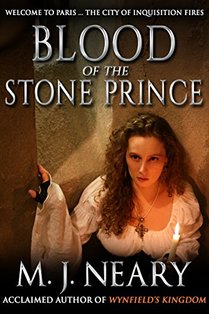 I feel the exact same way. Write when you can, every time you can. Which brings my to my next question - what's on the horizon for you? What are you working on? Do you have any new publications coming out? If you are a writer, you don't have to be in a cottage in the Alps to write. Inspiration strikes in the most unglamorous and uninspiring places (like court rooms, emergency rooms, public bathrooms). Actually, I do have a new novel coming out. Set in 15th century France, it is a medieval hipster novel. Jokes aside. It's a new genre I am trying to develop. All the angst of decadent, artsy urban living - but in a different era. You will recognize many universal archetypes: the sickly goth chick, the drama club geek, the child genius, the sensitive jock, the CEO of a pharmaceutical company. My goal was to create an ensemble cast of recognizable, tangible characters that modern audiences could relate to. The title is Blood of the Stone Prince, and it's coming out very soon. Your new book sounds just as interesting as Sirens Over the Hudson. I love the variety in your writing - I look forward to reading it! Thank you again for joining me, Marina! It's been a pleasure to talk with you. Thank you, my dear!
0 Comments
Leave a Reply. |
Who the heck is Alison McBain?I am a freelance writer and poet with over two hundred short pieces published in magazines and anthologies. Check out my 2024 writing challenge to write a book a week at Author Versus AI. For more info, please check out my "About Me" page. © Alison McBain. All rights reserved
Archives
July 2024
|


